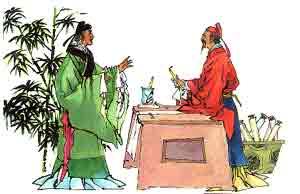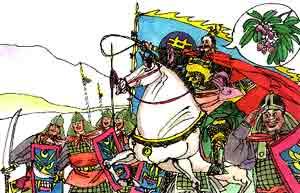| Chinese Idioms Learning (17) | |
|---|---|
| Dec 31, 2007 02:25 | |
 | Source: jsedu.net. No.1 胸有成竹 (Xiong 1 You 3 Cheng 2 Zhu 2). It means "having had already plans or designs in one's mind." History: In the song Dynasty (960-1279),there was a scholar whose name was Wen Tong and who styled himself Yuke. He was not only admired by others for his great learning, but also enjoyed widespread renown for his bamboo drawing. Every day there were always quite a few peoply who called at his house to ask for one of his bamboo drawings. As a matter of fact,there were quite a few painters contemporary with him who could draw bamboos fairly well. But how did it happen that Wen Tong drew better than anybody else? Of this point Su Shi and Chao Buzhi, buth of whom were Wen Tong's good friends, gave vivid explanations in their respective poetic and prose works. Actually, Wen Tong loved bamboos so much that he had grown various bamboos everywhere around his house. No matter what season it was and no matter whether it was sunny or rainy, he used to go to the bamboo forest to observe how they were growing. He pondered over the lenght and breadth of the bamboo poles as well as the shapes and colours of the leaves. Whenever he had gained a new understanding, he went back to his study, spread a piece of paper and prepareed some ink by rubbing an ink stick on an ink slab, and drew what was in his mind on the paper. Through accumulation over a long period of time, the images of the bamboo in different seasons, under different weather conditions and at different moments were deeply imprinted in his mind.So whenever he stood before the paper and picked up a painting brush with concentrated attention, the various forms of the bamboo which he had observed at ordinary times at once rose before his eyes. And so every time he was drawing bamboos he appeared confident and at ease, and all the bamboos he had painted were very vivid and true to lift. When people spoke highly of his paintings, he always said modestly that he had just put the images of the bamboo imprinted in his mind on the paper. A young man wanted to learn bamboo drawing; when he knew that Chao Buzhi had made a profound study of Wen Tong's art of drawing, he went to Chao Buzhi for instruction. Chao Buzhi wrote a poem to him. In the poem, there are the following two lines: When Yuke was painting the bamboos, He bad their images ready in his bosom. Later people have summarized the lines as " having had the images of the bamboo ready in one's bosom," which means having had ready plans or designs in one's mind before doing a certain job so that its success is guaranteed. It is also used go mean being calm and cool - headed in dealing with things.  |
| Dec 31, 2007 02:28 | |
 | No.2 望梅止渴 (Wang 4 Mei 2 Zhi 3 Ke 3). It means "Quenching Thirst by Watching Plums". History: Cao Cao of the Three Kingdoms period (220-265) was not only a capable politician in managing state affairs, but also a strategist good at leading troops in going to war. One summer, Cao Cao was leading his troops in a punitive expedition against Zhang Xiu. It was extraordinarily hot. The burning sun was like a fire, and the sky was cloudless. The soldiers were walking on the winding mountain paths. The dense forest and the hot rocks exposed to the sun on both sides of the paths made the soldiers feel suffocated. By noontime the soldiers' clothes were wet through with sweat, and the marching speed slowed down. Some solders of weak physique even fainted on the roadside. Seeing that the marching speed was slower and slower, Cao Cao was very worried because he feared that he might bungle the chance of winning the battle. But how could they quicken their speed? Cao Cao at once callde the guide and asked him on the quiet whether there was a source of water nearby. The guide shook his head, saying that the spring water was on the other side of the mountain, which was very far to have to make a detour to reach. Cao Cao realized that time didn't permit them to make such a detour. After thinking for a moment, he said to the guide, "Keep quiet. I'll find a way out." He knew that it would be to no avail to order his troops to quicken the steps. He had a brain wave and found a good solution. He spurred his horse and came to the head of the column. Pointing his horsewhip to the front, Cao Cao said, "Soldiers, I know there is a big forest of plums ahead. The plums there are both big and delicious. let's hurry along, and we will reach the forest of plums after bypassing this hill." When the solders heard this, they immediately slobbered. Picturing in their minds the sweet and sour flavour of the plums, the soldiers felt as if they were actually eating the plums, the soldiers felt as if they were actually eating the plums themselves. The morale greatly boosted, the soldiers quickened their steps a great deal automatically. This story comes from "The Fake Tangery" in Anecdotes of This World by Liu Yiqing of the Southern Dynasties period (420-589). From this story, people have derived the set phrase "quenching thirst by watching plums" to refer to trying to comfort oneself of others by idle dreams.  |
Post a Reply to: Chinese Idioms Learning (17)





 Copyright © 1998-2026 All rights reserved.
Copyright © 1998-2026 All rights reserved.